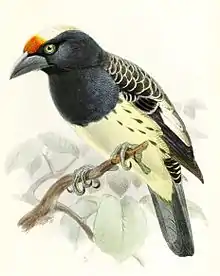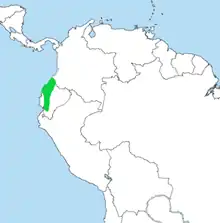Orange-fronted barbet
The orange-fronted barbet (Capito squamatus) is a species of bird in the family Capitonidae. It is found Ecuador and Colombia.[2]
| Orange-fronted barbet | |
|---|---|
 | |
| Illustration of the female, and a sound recording from Esmeraldas, Ecuador | |
| Scientific classification | |
| Domain: | Eukaryota |
| Kingdom: | Animalia |
| Phylum: | Chordata |
| Clade: | Dinosauria |
| Class: | Aves |
| Order: | Piciformes |
| Family: | Capitonidae |
| Genus: | Capito |
| Species: | C. squamatus |
| Binomial name | |
| Capito squamatus Salvin, 1876 | |
 | |
Taxonomy and systematics
The orange-fronted barbet is monotypic. It and the spot-crowned barbet (Capito maculicoronatus) are sister species and may form a superspecies.[3][4]
Description
The orange-fronted barbet is 16 to 18 cm (6.3 to 7.1 in) long and weighs 56 to 64 g (2.0 to 2.3 oz). The male has a white crown and an orange to red forecrown (the "front"). Its head except for the chin and its upperparts are black; white on some wing feathers remain visible when they are folded. Its underside from chin to the belly are yellowish white, sometimes with an orange tinge. Its flanks usually have light black spotting and the vent area is black. The female's front is yellow-orange; the rest of its head, its throat, and chest are black. Its black back has fine white markings on the wing-coverts.[3]
Distribution and habitat
The orange-fronted barbet is found from El Oro Province in southwestern Ecuador north into Nariño Department in extreme southwestern Colombia. There it inhabits wet lowlands and hill country, using primary and secondary forest and their edges as well as more open areas such as farms, orchards, and pastures with trees. In elevation it usually ranges from sea level to 800 m (2,600 ft) but can be found up to 1,500 m (4,900 ft) in some areas.[3]
Behavior
Feeding
The orange-fronted barbet usually forages in pairs, hunting all levels of the vegetation, and will join mixed-species foraging flocks. Its diet is primarily fruits and berries but also includes insects and spiders.[3]
Breeding
The orange-fronted barbet nests between July and September and possibly earlier. Like all New World barbets, it excavates a nest hole in a tree; this species apparently sites the cavity several meters above ground. Almost no other information on its breeding phenology has been published.[3]
Vocalization
The orange-fronted barbet's song is a "low-pitched, very fast, soft, purring trill" . Its call is a noisy "tyik" or "trrik" .[3]
Status
The IUCN has assessed the orange-fronted barbet as being of Least Concern. It has a very large range, and though its population is decreasing, it is estimated to number between 37,000 and 63,000.[1]
References
- BirdLife International (2020). "Capito squamatus". IUCN Red List of Threatened Species. 2020: e.T22681911A180498468. doi:10.2305/IUCN.UK.2020-3.RLTS.T22681911A180498468.en. Retrieved 14 September 2023.
- Gill, F.; Donsker, D.; Rasmussen, P. (January 2021). "IOC World Bird List (v 11.1)". Retrieved January 14, 2021.
- Short, L.L. and J. F. M. Horne (2020). Orange-fronted Barbet (Capito squamatus), version 1.0. In Birds of the World (J. del Hoyo, A. Elliott, J. Sargatal, D. A. Christie, and E. de Juana, Editors). Cornell Lab of Ornithology, Ithaca, NY, USA. https://doi.org/10.2173/bow.orfbar1.01 retrieved May 25, 2021
- Remsen, J. V., Jr., J. I. Areta, E. Bonaccorso, S. Claramunt, A. Jaramillo, D. F. Lane, J. F. Pacheco, M. B. Robbins, F. G. Stiles, and K. J. Zimmer. Version 23 May 2021. A classification of the bird species of South America. American Ornithological Society. https://www.museum.lsu.edu/~Remsen/SACCBaseline.htm retrieved May 24, 2021
